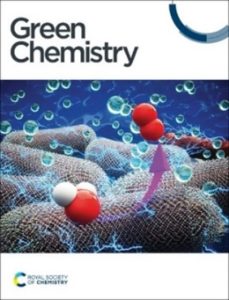Green Chemistry is delighted to announce a call for papers for its latest themed collection on Advances in Electrosynthesis for a Greener Chemical Industry to be promoted in late 2023 and Guest Edited by Jean-Philippe Tessonnier (Iowa State University), Season Si Chen (Tsinghua University), Vassiliki-Alexandra (Vanda) Glezakou (Oak Ridge National Laboratory), Adam Holewinski (University of Colorado, Boulder) and Juan Lopez-Ruiz (Pacific Northwest National Laboratory).
About this Themed Collection
This themed collection aims to highlight the recent advances on the electrosynthesis of chemicals and fuels. Electrosynthesis is a fast-expanding field of research that is poised to play a critical role in the decarbonization of the chemical industry and the transition to green transformations for chemical production. We encourage contributions on recent green advances in electrochemical transformations, including hybrid processes that combine electrochemical with photo- or biocatalytic (microbial) transformations, catalyst development, electrolyzer cell designs, computational studies, and techno-economic analysis (with a focus on environmental concerns or life-cycle analysis).
Preferred topics include but are not limited to:
 Electrosynthetic reactions with substantial waste reduction and/or safety benefits over conventional thermochemical transformations, such as hydrogenation, oxidation/epoxidation, amination, halogenation, and other coupling reactions
Electrosynthetic reactions with substantial waste reduction and/or safety benefits over conventional thermochemical transformations, such as hydrogenation, oxidation/epoxidation, amination, halogenation, and other coupling reactions- Conversion and utilisation of biogenic feedstocks such as lignocellulosic biomass and its components, fermentation broths, bio-crudes, and bio-oils
- Conversion and utilisation of aqueous waste streams, including nitrate-rich agricultural runoff, biomass pyrolysis water, and food processing waste streams
- Conversion of synthetic waste such as (micro)plastics
- Generation of renewable ammonia, natural gas, hydrogen, syngas, and fuels from biogenic and synthetic feedstocks
- Capture and conversion of CO2 into products and energy carriers
- Novel processes for sustainable energy storage and release
- Development of new electrolyzer designs and configurations such as paired electrolyzers for greener processes
This call for papers is open for the following article types:
- Communications
- Full papers
- Reviews
Open for Submissions until 15th June 2023
First papers published!
Read some of the first articles published in this Themed Collection:
- Exploring the electrochemical ring hydrogenation of furanic compounds
Thorben Lenk, Valentin Rueß, Janko Gresch and Uwe Schröder
Green Chem., 2023,25, 3077-3085. DOI:10.1039/D3GC00515A
. - Electrocatalytic amino acid synthesis from biomass-derivable keto acids over ball milled carbon nanotubes
And have a look at this Open Access Perspective
-
Using earth abundant materials for long duration energy storage: electro-chemical and thermo-chemical cycling of bicarbonate/formate
Oliver Y. Gutiérrez, Katarzyna Grubel, Jotheeswari Kothandaraman, Juan A. Lopez-Ruiz, Kriston P. Brooks, Mark E. Bowden and Tom Autrey
Green Chem., 2023, Advance Article. DOI:10.1039/D3GC00219E
Read the full themed collection here
There is still time, submit your work!
If you would like to contribute to this themed collection, you can submit your article directly through the journal’s online submission service at https://mc.manuscriptcentral.com/gc. Please answer the themed collection question in the submission form when uploading your files to say that this is a contribution to the themed collection and add a “Note to the Editor” that this is from the Open Call. The Editorial Office reserves the right to check suitability of submissions in relation to the scope of both the journal and the collection, and inclusion of accepted articles in the final themed collection is not guaranteed.
Submissions to the journal should present a significant advance in green chemistry. Please see the journal’s website for more information on the journal’s scope, standards, article types and author guidelines. To be published, work must present a significant advance in green chemistry, focusing on an advance in the sustainability of the conditions, the efficiency of the process or provide insight into an important green process. Papers must contain a comparison with existing methods and demonstrate advantages over those methods before publication can be considered.
If you have any questions about the journal or the collection, please contact the journal inbox.
Looking forward to your submissions!











